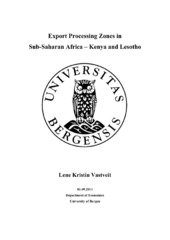Export processing zones in Sub-Saharan Africa - Kenya and Lesotho
Master thesis
Permanent lenke
https://hdl.handle.net/1956/7611Utgivelsesdato
2013-11-30Metadata
Vis full innførselSamlinger
- Department of Economics [289]
Sammendrag
This thesis examines two cases of Export Processing Zone (EPZ) programmes in sub-Saharan Africa (SSA), specifically in Kenya and Lesotho. Using data from the respective countries' EPZ programme authorities, central banks, relevant studies, and country reports, I show that although the programmes have facilitated employment generation and foreign exchange earnings from textile and apparel exports, such exports rely highly on preferential trade agreements such as the African Growth and Opportunity Act (AGOA). The reliance on preferential market access, and the uncertainty regarding the continuation of such preferences are important sources of vulnerability. This causes fluctuations in investments and also helps explain the low level of backward linkages. This is especially evident in Lesotho. Moreover, such production within the zones is mainly of low productivity and low added value. The vast number of zone programmes that have materialised in the last decades has contributed to reducing the possible net benefit of EPZs, and the increase in competition has made it difficult to attract investors. Zone programmes in Kenya and Lesotho are seen as relatively successful compared to other SSA zone programmes, yet investment and employment levels within the zones are low compared to many programmes in other regions. Several factors hamper larger investments, such as high labour unit costs, high electricity prices, inefficient bureaucracy, corruption, as well as labour unions and political opposition. EPZ programmes may help make it easier to do business in the host countries, and improve investors' perception of the countries' attitudes towards foreign direct investment (FDI). However, SSA zone programmes should to a greater extent target industries and services in which they have good prospects of developing a competitive advantage, regardless of trade preferences, which provide good opportunities for human capital and technology transfers, and which generate demand linkages. SSA countries with large endowments of natural resources may be better able to capitalize upon their comparative advantage by focusing on industries that take advantage of the countries' natural resources, rather than on the labour-intensive industries that have traditionally located in EPZs. Due to high competition and demand for good quality infrastructure, EPZ programmes are generally better suited in more developed SSA countries than as a tool to facilitate development in the poorest countries.
